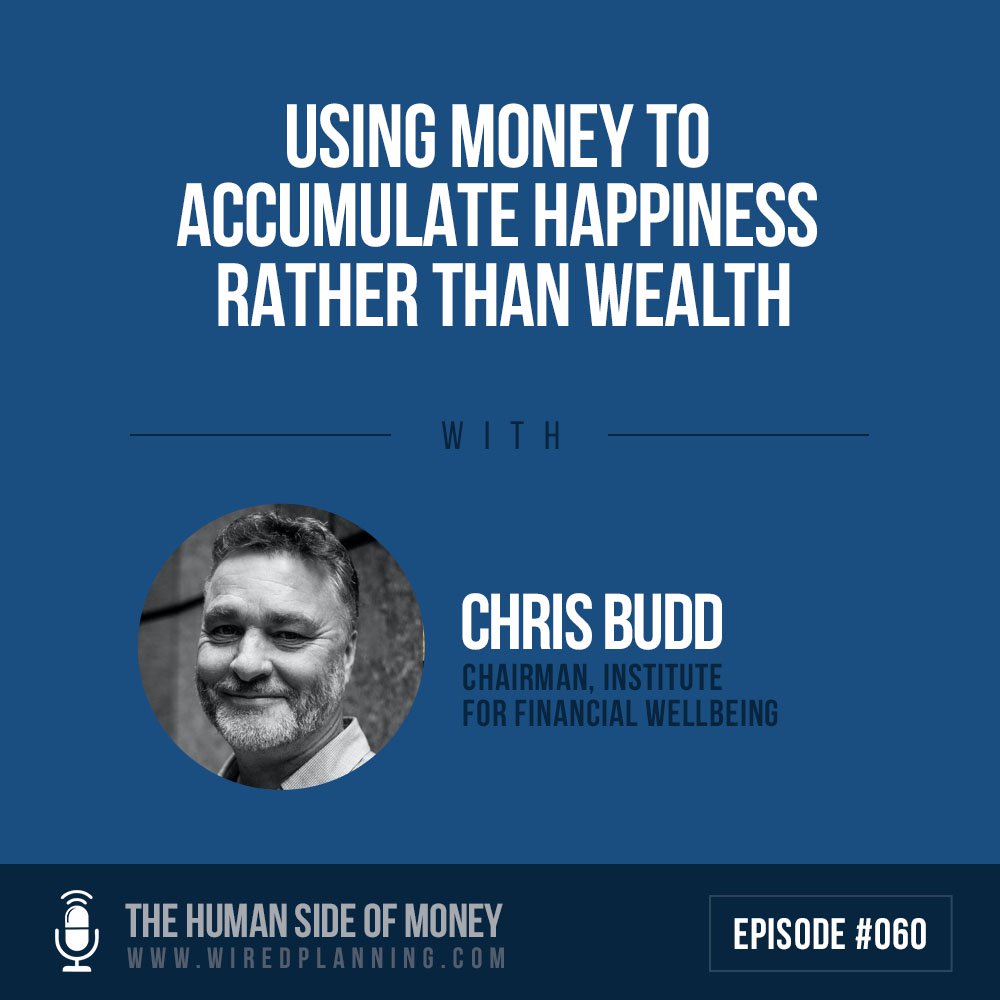Show Links
*If you want to be notified when the next episode packed full of practical tips and strategies to master the human side of money will be released, you can:
- Subscribe to the Show
- Join the community of like-minded advisors and planners across the world being notified via email. In addition to podcast releases, you’ll get our monthly “Wisdom Round Up” where we deliver to you the best content from around the industry on applying behavioral finance and mastering the human side of money.
*The featured partner for this episode is a must-have tool for helping clients follow-through and implement advice. After all, the best advice is useless in the absence of execution. Rather than stressing about follow up calls and emails, Knudge provides a built-in system designed to improve follow-through.
Episode Summary
Money and happiness will forever be intertwined, specifically the relationship between the two.
One one hand, you’ll hear statements like “Money can’t buy happiness.”
On the other hand, you’ll hear “Money may not be able to buy happiness, but I’d rather cry in a Ferrari than on a bicycle.”
You can find research that shows happiness plateaus after an annual income of $75,000.
And, you can find research that reveals happiness continues to rise as your income rises.
There are countless examples of people who are financially wealthy but emotionally unfulfilled.
And, there are countless examples of people who are financially wealthy and living meaningful, happy lives.
Elizabeth Dunn, Chief Science Officer at Happy Money, says, “Money does matter for happiness, that’s never been in doubt. But it’s not the case that more money automatically yields happiness. Instead we should more closely evaluate how we’re spending money. People get more happiness from buying experiences than buying personal things.”
In other words, money may not be able to buy happiness.
But, it can certainly influence it.
And, when you’re working with people and their money, you have the opportunity to help them use their money in a way that accumulates happiness rather than just simply accumulating wealth.
Of course, that first requires a deeper understanding of happiness. Not only what it is, but the components that contribute to happiness, and how money can either increase or decrease it.
Fortunately, Chris Budd runs an organization focused on helping advisors and planners understand what clients actually want from their money in order to help them become happier and more fulfilled, not just wealthier.
Things You’ll Learn
- A definitive explanation of what financial wellbeing IS and ISN’T
- The difference between intrinsic and extrinsic motivation and its application to financial planning
- A question you can ask clients to uncover whether their money is creating happiness in their life
- Ideas for preparing long-term clients for a new conversation around happiness
- Why the worst first question to ask a client is “What does money mean to you?”
- Why a business coaching course changed his career forever
- Two rules for constructing questions
- The “un-training” that every advisor needs to improve their relationships with clients
- When he realized clients didn’t actually want to talk about money
- Why the “financial wellbeing junkie” conversation is one to have with every client
- The three dimensions that determine our happiness
- The ways to spend money to create long-term happiness rather than short-term
- The surprisingly powerful psychological benefits of giving money to charity
About Chris Budd
Chris Budd is the Chairman of The Institute For Financial Wellbeing, an organization shifting the focus of the financial planning industry towards the discovery and understanding of what clients actually want from their money.
He is a highly-regarded speaker, the author of The Financial Well Being Book, The Eternal Business, and the host of “The Financial Wellbeing Podcast.”
He’s also the Chairman of Ovation Finance, a financial planning practice that he founded in 2000. In 2018, he sold a majority of the practice to an Employee Ownership Trust (EOT), which now controls the company for the benefit of its employees. And, he is now providing coaching and business consultancy to owners and employees interested in that route.
Other Episodes You’ll Like On The Link Between Money And Happiness
- Mapping Money To Meaning In Pursuit Of Funded Contentment with Brian Portnoy
- A 5-Step Planning Process For Syncing Emotional And Financial Well-Being with Amy Mullen
- Uncovering Your Client’s Most Meaningful Goals with Samantha Lamas
Resources
Institute For Financial Wellbeing
The Financial Well Being Book: Creating Financial Peace of Mind by Chris Budd
The Financial Wellbeing Podcast
The Book of Joy: Lasting Happiness in a Changing World by Dalai Lama, Desmond Tutu, Douglas Carlton Abrams
Wellbeing: The Five Essential Elements by Tom Rath and Jim Harter
What Makes a Good Life? Lessons From The Longest Study on Happiness. (TEDx You Tube)
Happy Money: The Science of Happier Spending by Elizabeth Dunn
It’s Not About The Nail (YouTube)
Whenever you’re ready, there are 3 ways I can help you master the human side of advice:
- HSOA Masterclass: An 8-week group program on building trust & connection, aligning money and life, and delivering frictionless advice.
- The Ultimate Discovery Meeting: A proven framework to seamlessly convert prospects into life-long clients in one meeting.
- HSOA Community (COMING SOON!): An online space to meet, collaborate, discuss, brainstorm, learn and grow with other advisors passionate about the human side of advice
If you’re interested, let me know here.





